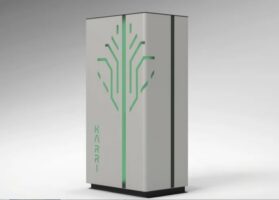The new chief executive of the Australian Energy Market Operator, Audrey Zibelman, says she wants to get rid of the “super peaks” that have been a feature of the energy market for the past few decades, and proposes to use rooftop solar and storage to help achieve this.
In further confirmation of the radical change in the energy industry that she is is keen to embrace, Zibelman says the grid can be both smarter and faster, and cheaper and more reliable, by embracing “distributed” generation.
“We can make the system more efficient by using these advanced technologies (solar and storage and smart software) and by making sure we use the system so we don’t have these super peaks,” Zibelman said in a interview on ABC radio.
Zibelman says the key is making sure that the services offered by homes and households for their rooftop solar and battery storage has a financial incentive to help the grid.
“What if someone has put in a battery, has rooftop solar, and they are willing to help manage the grid, and to get paid for it … so rather than get paid to build a new generator, just in case we need it, we can’t shift their loads of their peaks and get paid for that.
She uses the example of New York, another high-price energy state, which after Hurricane Sandy looked to distributed generation as the answer to grid security and reliability, and lower costs.
In Brooklyn, for instance, a solar-based microgrid – with batteries and thermostats – was built that avoided the construction of a big and expensive new sub-station, and saved millions of dollars.
The utility went out and sought couple of 100MWs of capacity – and came up with some innovative solutions –
“We now have this micro grid of solar and storage, including some low-income housing, it’s not just about rich people putting solar on their rooftops – and created a community of interest … and become part of urban planning.”
She says Australia’s is also pursing such schemes as part of “proof of concept” exercises, but she wants it integrated soon into the National Electricity Market.
Such ideas have been doing the circuit of the energy industry for some time, particularly since the blackout in South Australia after their major storm in September last year.
The significance of Zibelman’s remarks, however, is that this is the first time the head of the one of the three big institutions that controls Australia’s energy market is talking this way.
Networks have said this, even big retailers have said this, and so have any numbers of solar and battery storage companies, along with many independent experts, but not someone in such a key position.
Of course, Zibelman does not set the rules, that is the role of the much-criticised Australian Energy Markets Commission. But she fully intends to make her views known.
She does not appear to be the least bit phased by the toxic political debate over energy policies in Australia either, or the attachment of the incumbent utilities to their current business models.
The interesting bit is her view that some of the excess capacity carried in Australia, and she seems to be alluding to generation and network, is all but redundant, or should be.
“When we built the grid in the last century we built it around the fact that at the time the most efficient way to build and manage the grid was around centralised coal and gas plants – on the assumption that demand did not respond to price.
“Because of that, electricity cannot be stored. So had to build power plants just to sit there, just in case it was a hot day.”
Those peaks, accompanied by soaring electricity prices caused when those machines have been switched on, have underpinned the business model of the fossil fuel generators, because it has delivered windfall revenue .
Around one third of their annual revenue came in just 30 hours of peak supply, and generators have been using their ability to shape the market to extract higher prices over longer periods in the last 6 to 12 months.
“We can’t simply drive our system by looking in the rear view mirror,” Zibelmain says.
“AEMO’s role is a very clear role, we have a job to ensure energy security for all Australians.
“As a not-for-profit we don’t have a particular interest in saying this is going to be better for us, what we are focused on is what is better for consumers.”
Zibelman describes it as an issue of “sound economics” – people are putting solar in the roof because it makes economic sense to them it not an issue of politics ut an issue of sound economics.
“What we are seeing is that the cost of renewable and the cost of storage continues to drop … it becomes not just an environmental choice but an economic choice.
“What we can do in Australia is to recognise that we can help drive value by really working with consumer representative to use these resources better. and that’s what I am passionate about.
“It is not a political issue – we all want the same thing … people want the lights to stay on.”
The interview with Saturday Extra’s Geraldine Doogue is worth a listen. You can find it here.








